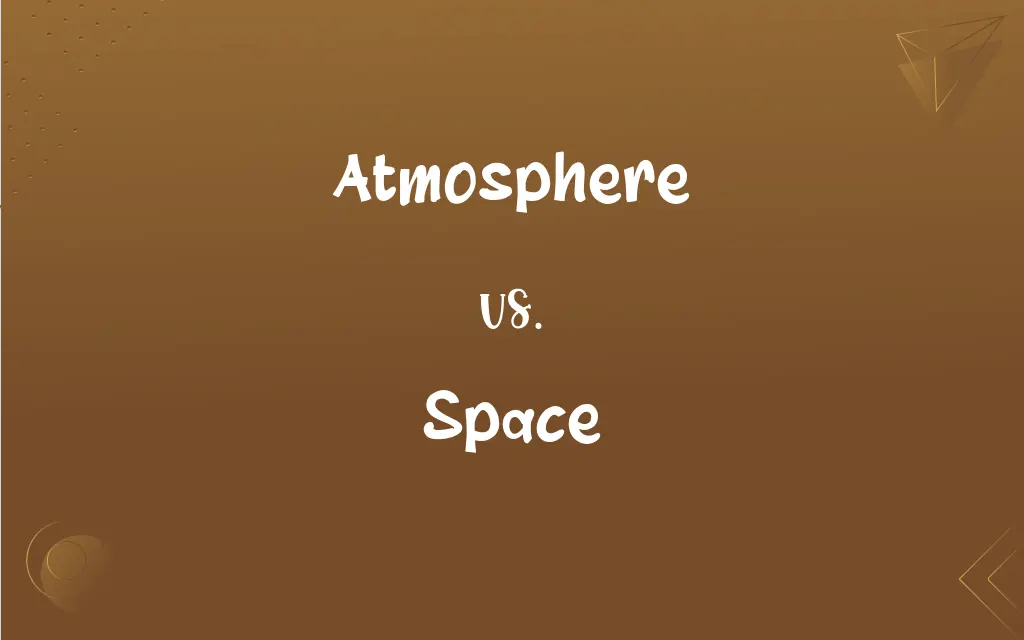Atmosphere vs. Space: What's the Difference?
By Janet White || Published on December 9, 2023
The atmosphere is the layer of gases surrounding a planet, while space is the vast, nearly empty expanse beyond Earth's atmosphere.

Key Differences
The atmosphere is composed of gases like nitrogen and oxygen that support life on Earth. Space, in contrast, is a vacuum with very few particles, mostly devoid of matter.
The atmosphere is the gaseous envelope around the Earth, extending up to about 10,000 km. While, space begins where the Earth's atmosphere ends, known as the Karman line, approximately 100 km above the Earth's surface.
The atmosphere protects life on Earth by absorbing ultraviolet solar radiation and reducing temperature extremes. Space, however, being a vacuum, lacks these protective qualities and is characterized by extreme temperatures and radiation.
Studying the atmosphere involves understanding weather, climate, and air quality on Earth. Space exploration focuses on celestial bodies, the physics of the cosmos, and the potential for extraterrestrial life.
Human activities directly affect the atmosphere through pollution and greenhouse gas emissions. In space, human presence is limited to space exploration and satellite deployment, with minimal direct impact on the vacuum of space.
ADVERTISEMENT
Comparison Chart
Composition
Mixture of gases like nitrogen, oxygen.
Vacuum, sparse particles.
Location and Boundaries
Surrounds Earth, up to 10,000 km.
Beyond Earth's atmosphere, starts at 100 km.
Role and Function
Protects life, moderates climate.
Hosts celestial bodies, lacks protective atmosphere.
Exploration and Study
Weather, climate, air quality research.
Celestial studies, astrophysics.
Human Interaction
Directly affected by human activities.
Limited human presence, space exploration.
ADVERTISEMENT
Atmosphere and Space Definitions
Atmosphere
The layer of gases surrounding a planet.
The Earth's atmosphere is crucial for life.
Space
The infinite expanse beyond Earth's atmosphere.
Astronauts explore the mysteries of space.
Atmosphere
The mood or tone of a setting or situation.
The candlelit dinner had a romantic atmosphere.
Space
An area that is available or unoccupied.
She found a space to park her car.
Atmosphere
The air in a particular place.
The atmosphere in the forest felt fresh and clean.
Space
The physical universe beyond the Earth's atmosphere.
Space contains billions of galaxies.
Atmosphere
The envelope of gases retained by a celestial body's gravity.
Mars has a thin atmosphere compared to Earth.
Space
A continuous area or expanse.
There's a lot of open space in the countryside.
Atmosphere
A surrounding influence or environment.
The atmosphere of the meeting was tense.
Space
The freedom to live, think, and develop.
He needed space to make his own decisions.
Atmosphere
The gaseous mass or envelope surrounding a celestial body, especially the one surrounding the earth, and retained by the celestial body's gravitational field.
Space
(Mathematics) A set of elements or points satisfying specified geometric postulates
Non-Euclidean space.
Atmosphere
The air or climate in a specific place.
Space
The infinite extension of the three-dimensional region in which all matter exists.
FAQs
How high does the atmosphere extend?
Up to about 10,000 km above Earth.
Does the atmosphere support life?
Yes, it's essential for life on Earth.
How does the atmosphere affect weather?
It plays a key role in weather patterns.
What is space?
The vast vacuum beyond Earth's atmosphere.
What is in space?
Mostly a vacuum with sparse particles and celestial bodies.
How far is space from Earth?
It starts about 100 km above Earth.
What is the atmosphere?
The layer of gases surrounding Earth.
What gases are in the atmosphere?
Mainly nitrogen and oxygen.
Is there air in space?
No, space is a near-perfect vacuum.
Can humans survive in space?
Only with protective suits and spacecraft.
Are there planets in space?
Yes, along with stars, galaxies, and other celestial bodies.
Why can't we breathe in space?
Space lacks air and is a vacuum.
How is the atmosphere studied?
Through meteorology and environmental science.
How do we study space?
With telescopes, satellites, and space missions.
Can we breathe in the atmosphere?
Yes, it contains breathable air.
Does the atmosphere protect us?
Yes, from harmful solar radiation and meteors.
Does pollution affect the atmosphere?
Yes, it impacts air quality and climate.
Is the atmosphere part of space?
No, it's distinct from space.
What is the temperature in space?
Extremely cold or hot, depending on sun exposure.
What happens to objects in space?
They float due to lack of gravity.
About Author
Written by
Janet WhiteJanet White has been an esteemed writer and blogger for Difference Wiki. Holding a Master's degree in Science and Medical Journalism from the prestigious Boston University, she has consistently demonstrated her expertise and passion for her field. When she's not immersed in her work, Janet relishes her time exercising, delving into a good book, and cherishing moments with friends and family.






































































